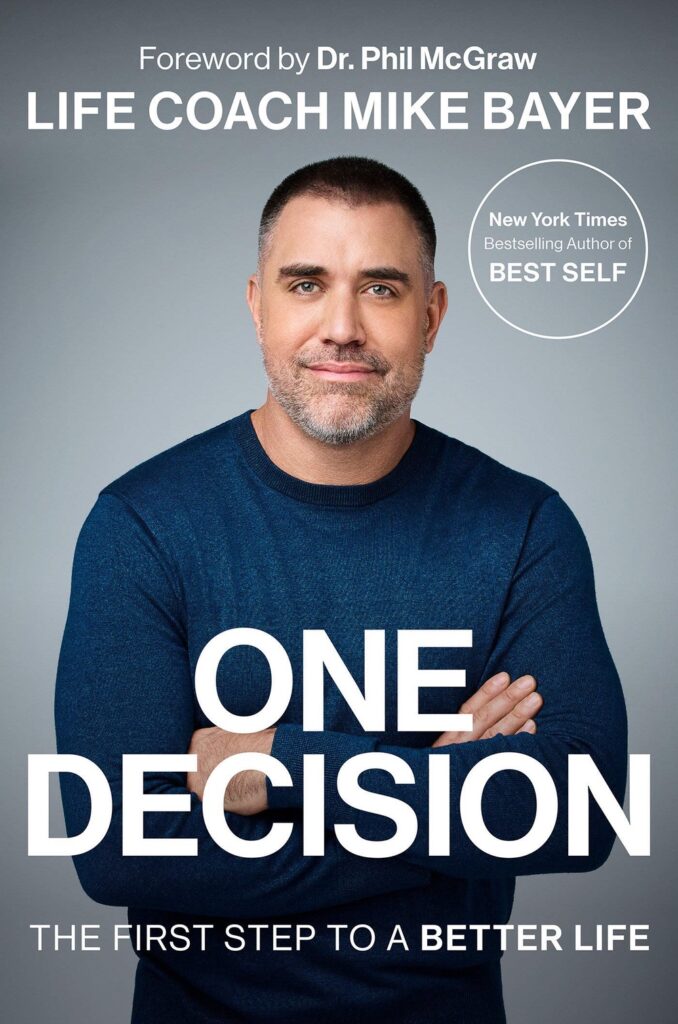Sharing my learnings from the book, One Decision by Coach Mike Bayer
One Decision by Coach Mike Bayer
One Decision is an inspiring and practical action plan to help you improve your life, find your purpose, improve your mental health and relationships, work on your physical health, or and/even make more money. Drawing on his twenty years’ experience helping individuals from all walks of life and backgrounds to make real and lasting change, Coach Mike knows how to motivate you to take a risk, be bold, and take real action toward a better life.

- What’s something that we all do, without fail, every single day? We make decisions. About 35,000 of them, in fact. Most of these decisions are instinctive; we’re not even aware of making them. These decisions don’t impact us in major ways, but there’s one conscious decision that can bring positive change to our lives. It’s the result of many intentional decisions. And the first and most important of these is choosing to see opportunities rather than obstacles.
- There are opportunities in any situation, no matter how bad it may seem. When you focus on them, you become optimistic and solutions-oriented. You can then take actions that allow you to grow, learn new things, and steer your life in positive directions. When you focus on obstacles, on the other hand, your problems seem unsolvable. You feel stuck and sorry for yourself. You might even blame others or make excuses for your circumstances.
- to switch from an obstacle mindset to one primed for opportunities – The key is understanding the thinking patterns that shape how we view the world. They determine whether we perceive opportunities or obstacles.
- We often convince ourselves that we know what’s going to happen. And then we make decisions based on those predictions. But more often than not, those predictions are baseless.
- When we fall prey to fortune-telling, we’re predicting the future without any facts to back it up. This negative pattern steals opportunities from us; we convince ourselves that the odds are against us, so we don’t even bother trying.
- In most cases, fortune-telling is an act of fear. We’re afraid of disappointment or of having difficult conversations. Fortune-telling is a way of avoiding these things. To escape the trap of fortune-telling, we need to engage its positive counterpart: fact-finding.
- When you overgeneralize, you allow single events, experiences, or even preconceived ideas to shape how you view yourself and the world around you. Needless to say, this greatly limits your ability to see opportunities.
- The remedy for overgeneralizing is zooming out from single events or stereotypes. In other words, you have to be objective. That means you shouldn’t make a decision based on one incident. Rather, take all the available information into account. And instead of relying on stereotypes or assumptions, make an effort to learn about people before you judge them. When you do this, you’ll develop new ideas and perspectives, creating a gateway to new opportunities.
- A rigid mindset hurts us, while a relaxed one makes us adaptable.
- Rigidity is a negative force. It makes it difficult for us to change course or consider alternative methods. And it doesn’t just cause stress and frustration. It also makes us miss out on opportunities that can lead to growth or success.
- To counter rigidity, we need the positive force of relaxation. When we adopt a relaxed mindset, we approach things calmly, we make room for the perspectives of others, and we accept that we can’t control life. This allows us to go with the flow of new ideas, methods, and – of course – opportunities.
- making important decisions can be incredibly difficult. So much so that we sometimes go round in circles. We weigh the pros and cons repeatedly, imagining every possible outcome. We ask everyone for their opinion. Eventually, we settle on a decision. Or at least we think we do. All it takes is a tiny, nagging thought or a comment about something we haven’t considered, and we’re back at square one. Indecision like this can be very frustrating. This negative force is confusion. It doesn’t just overwhelm us. It holds us back.
- to stop the negative cycle of confusion, you need to tap into your purpose. This doesn’t always have to be a grand life purpose. Sometimes it’s simply what you’d like to achieve in that particular situation. Then consider each potential choice. How does it align with your purpose?
- Emotions are completely natural. Your emotions protect you, provide motivation, and help you form relationships. But they can also be overwhelming. They can drive you to make decisions based on what you feel, instead of what’s actually happening. And in most cases, such decisions aren’t in your best interests. If you’ve ever experienced this, then you’ve succumbed to emotional reasoning.
- When you use emotional reasoning, you allow temporary feelings to determine your actions and decisions. As a result, you can deprive yourself of opportunities.
- If you want to overcome emotional reasoning and make better decisions, you need to turn your attention to the evidence. Evidence-based reasoning is the positive force that helps you take back power from your feelings. It involves considering factual information before making a decision.
- When you’re trying to seize opportunities and make the right decisions, it’s not enough to understand the negative and positive forces involved. You also need a decision-making team. This is a group of people who can offer good advice, help you take the necessary steps, and provide emotional support. the number one rule is to choose those who know you inside and out and are experts in the relevant area.


Leave a Reply